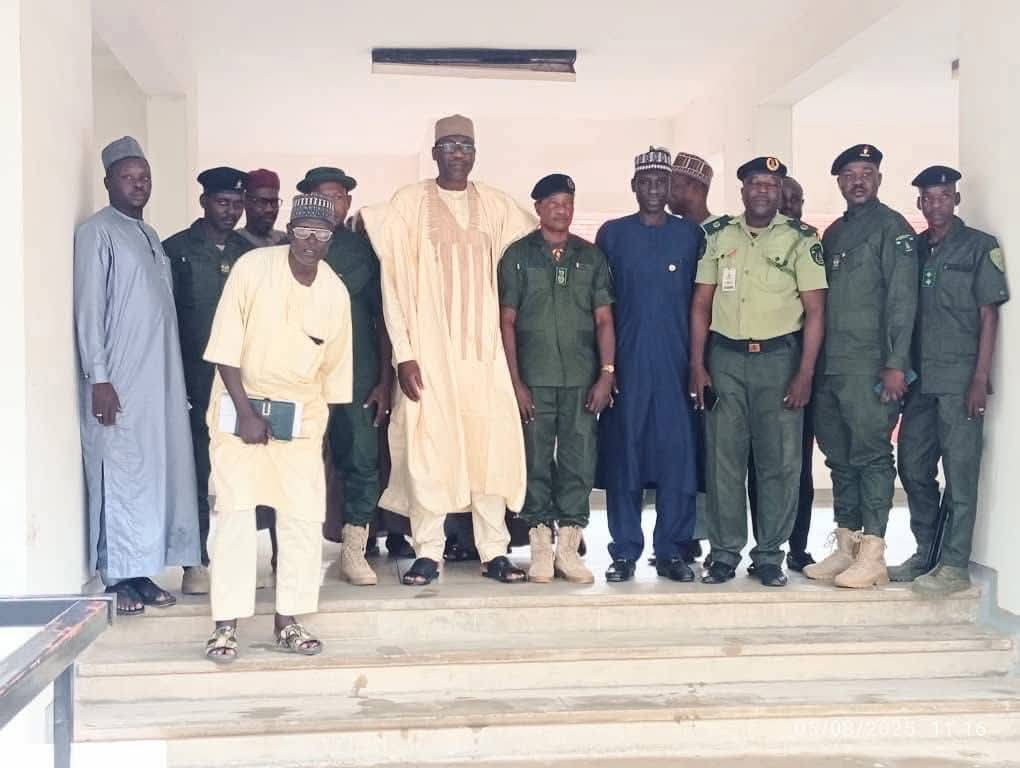
Forest Guards: Borno Government, Chad Basin National Park Forge Strategic Alliance on Security and Ecological Restoration
The Borno State Government has reaffirmed its commitment to supporting the Federal Government’s Forest Guard initiative, aimed at protecting rural and agrarian communities while boosting communal peace and food security across Nigeria.
In a landmark step towards enhanced inter-agency collaboration, the Borno State Government and the Chad Basin National Park have pledged to deepen joint efforts in environmental protection, internal security, and community resilience.
On Tuesday, 5 August 2025, the Honourable Commissioner for Information and Internal Security, Professor Usman A. Tar, received the Conservator of Chad Basin National Park, Mr. Jimoh Bolanle Oladosu, and his delegation during a courtesy visit to the Musa Usman Secretariat, Maiduguri. The visit underscored the mutual resolve to tackle the overlapping challenges of insurgency and environmental degradation in the Northeast through integrated strategies.
Professor Tar, a distinguished scholar in political science and defence studies, praised the Park authorities for their resilience in managing vast ecological assets in conflict-affected areas. He described the operation of a nature-based institution within an active war zone as highly demanding, noting that the portion of Chad Basin National Park within Borno spans over 1,258 square kilometres—comparable in size to the nation of Sierra Leone.
Highlighting the park’s strategic role in regional peacebuilding and environmental stability, the commissioner called for operational synergy between the Park and state security structures. He outlined key areas for collaboration, including the restoration of degraded forest areas such as Walasa, Amchaka, and Gulumba; the expansion of the Forest Guard programme under the Office of the National Security Adviser; and the deployment of innovative deterrent technologies to mitigate human-wildlife conflict—particularly elephant incursions into farmland.
He revealed that Borno, in coordination with federal authorities, is already training Forest Guards drawn from local hunter communities and members of the Civilian Joint Task Force, leveraging their deep ecological knowledge of the terrain. He also advocated for an increased recruitment quota for the state, citing its vast and vulnerable geography.
Professor Tar emphasized the urgency of deploying intelligent deterrent systems, such as electrified or smart barriers, to prevent wildlife from straying into farmlands—a growing threat to food security in the region.
Turning to environmental issues, he voiced concern over rampant desertification and unchecked deforestation. He highlighted the state’s afforestation campaign, which aims to plant millions of trees across insurgency-ravaged communities, and invited the Park authorities to actively participate in the initiative in alignment with the Ministry of Environment’s policies.
He further emphasized the importance of enforcing the newly enacted environmental protection laws in Borno State. These laws, backed by recent executive orders from Governor Babagana Umara Zulum, prohibit illegal tree felling and impose stringent penalties on environmental offences. He urged the Park leadership to study the new legal framework and work with the state in ensuring its full enforcement.
“All your observations and concerns have been duly noted,” Professor Tar assured. “Please submit them in writing. Those within our ministry’s purview will be addressed, and others will be forwarded to His Excellency the Governor for necessary action.”
In response, Mr. Oladosu described the visit as both a familiarisation and strategic engagement tour aimed at deepening institutional collaboration. He acknowledged the critical role of the state government in enabling the Park to carry out its mandate amid persistent security and environmental challenges.
He highlighted the park’s rich biodiversity, including globally endangered species such as elephants, lions, giraffes, and zebras. He identified the Rudu-Ma sector in Bama Local Government Area as a potential UNESCO World Heritage Site due to its ecological significance.
Mr. Oladosu also noted past contributions of the Park, including the containment of stray elephants in 2021, rescue efforts during the 2024 Maiduguri flood emergency, and support to the security sector through jungle intelligence gathering. He cited the Park’s ongoing involvement in forest guard training and youth empowerment through community outreach and student internship programmes.
However, he expressed concern over major operational challenges, including inadequate patrol logistics, exclusion from state-level security interventions, and infrastructure destroyed by insurgents. He called for urgent support to rebuild ranger posts in reclaimed territories and appealed for the provision of patrol vehicles, motorcycles, and staff housing.
“We are a strategic security partner in our own right,” Mr. Oladosu said. “We appreciate the Honourable Commissioner’s openness and look forward to sustained collaboration for the good of the people, the environment, and regional stability.”
He further provided historical context, noting that Chad Basin National Park was formally established in 1991 by the Federal Government through a gazette, following the consolidation of existing forest and game reserves across the Northeast. Managed by the National Parks Service under the Federal Ministry of Environment, the park serves as both a biodiversity sanctuary and a buffer against desertification and land degradation.
Spanning Borno and Yobe States, the park comprises three sectors: the Chingurmi Duguma Sector (Borno), and the Yuguda Nguru Wetlands and Bulatura Sectors (Yobe). Its transboundary location—bordering Cameroon, Niger, and Chad—further enhances its importance in regional conservation and cross-border security operations.
The meeting was attended by the Permanent Secretary of the Ministry, Alhaji Aminu Barde Chamalwa, alongside directors and senior staff members of the Ministry.















Comments